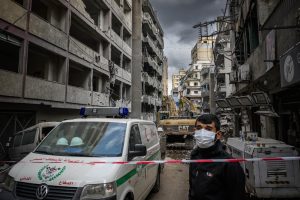
Manuel Ortiz, periodista, fotógrafo y sociólogo, ha logrado salir de Líbano, pero muchos otros no, y es que la guerra ha dejado un sin fin de estragos, entre ellos la muerte de miles de mujeres, hombres, niños y periodistas; y pese a un alto al fuego, los ataques continúan por parte de Israel a Líbano.
Así lo relató Ortiz, quien en entrevista con Marcos Gutiérrez en el programa de radio “Hecho en California”, detalló sus últimos días en la zona de guerra fueron muy intensos mientras se estaba dialogando el alto al fuego, donde Estados Unidos y Francia fueron los mediadores.
“Mientras se estaban realizando las conversaciones del acuerdo, Israel intensificó los ataques como nunca antes se había visto, en el último día hubieron alrededor de 30 ataques solamente en Beirut”, contó.
Al dirigirse al campamento de Chatila, el cual es de refugiados palestinos que en 1982 vivieron una matanza de más de tres mil ciudadanos, fue a hacer un recorrido, y mientras este se llevaba a cabo, los ataques se intensificaron.
“Parecía que Israel quería causar el mayor daño posible, matar al mayor número de personas antes de quedarse unos días sin poder bombardear, era verdaderamente brutal lo que estaba ocurriendo”, detalló.
“Desde este barrio se escuchaban las bombas muy fuerte; hay muchos niños, mujeres y personas de la tercera edad, pues es uno de los barrios más marginados. Las comunidades de refugiados palestinos que no tienen un estatus migratorio, como tal son personas, están aquí sin patria”, agregó.
Manuel Ortiz narró que los niños estaban entre los pasillos angostos, porque los edificios están pegados unos de los otros, pues hay un gran patio donde hacen actividades.
“El primer día, el día 27, el acuerdo entró en vigor a las 4:00 de la mañana, por lo que muchas de las personas desplazadas que estaban en campamentos se empezaron a dirigir hacia el sur, pese a que el gobierno, advirtieron que todavía no fueran. El día 27 hubo una celebración, una celebración agridulce”, dijo.
¿Cómo comenzó este asunto?
Ortiz explicó que hay un genocidio en curso que está cometiendo el estado de Israel en Gaza, “están masacrando a un pueblo, hay una limpieza étnica en Oriente Medio ya que se está llevando a cabo por Israel con el patrocinio con el apoyo de las grandes potencias, principalmente con Estados Unidos”.
“El alto al fuego inició el día 27 de noviembre y fue un OK, ya le dejo de pegar a Líbano. A mi me consta que han atacado a los niños, a civiles, donde vivía la gente en pueblos enteros; y lo que ocurrió el mismo día, es atacar con mucha mayor fuerza a Gaza. Este genocidio que ya estaba en curso se aceleró”.
En ese sentido, destacó que Benjamín Netanyahu, primer ministro de Israel, dijo que la paz depende de Líbano y de Hezbolá, que él esta listo para atacar en cualquier momento, lo que a Ortiz le parce un discurso que no tiene sentido, “porque se le olvida que es él quien comete el genocidio y claro que parece ser que lo único que quiere son guerras”.
“Cada que caía una bomba. Yo pensaba ¿cuántas personas están muriendo en este momento? Es doloroso: imaginemos que estamos en el tiempo en que se estaba asesinando a los judíos en los campos de concentración y en el futuro nos preguntaríamos qué estaba haciendo en contra en esos momentos, ¿fui indiferente? ¿Le aplaudí? Yo creo que en un futuro nos preguntaremos que fue lo que hicimos”, refirió.
Para el periodista Manuel Ortiz, las cosas se arreglan por medio de la paz y no de la guerra y las armas.
“Soy una persona que piensa que las cosas se arreglan vía la paz, vía la negociación y sigo pensando que esa es la vía, pero aquí es muy difícil, porque ves que los militares suben imágenes con fotografías de gente con la que se burlan, que persiguen a niños y les disparan”.
“Deberíamos de hacer una intervención mundial mucho más efectiva, tendríamos que tener mayor indignación ahí donde esté cada uno. Yo sé que sí, de repente, hay protestas y se apagan, yo no lo puedo creer, en un planeta tan chiquito, tan pequeñito, está ocurriendo otro genocidio en estos momentos y pues parece que no hay forma de pararlo”.
“Cada que pagamos algo, cada que pagamos nuestros impuestos se va algo de esto para que se compren armas y lleguen hasta el otro lado del mundo”, concluyó.
Te puede interesar: Sikka, un bello ejemplo de la resiliencia de Líbano

